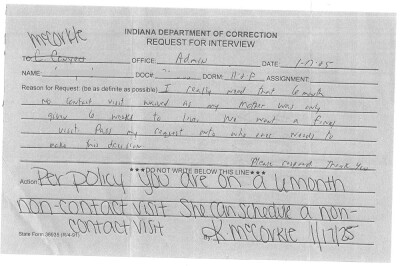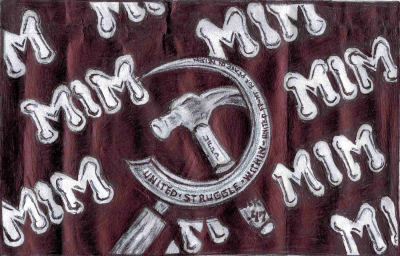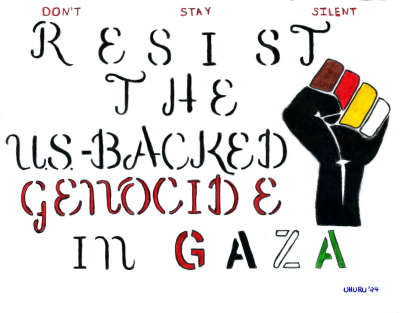
A Timeline History of the Black Panther Party & Black Liberation Army
MIM recognizes the Black Panther Party for Self-Defense (BPP) as the most advanced communist vanguard to have existed in North America. Specifically, we uphold the BPP from 1966 to 1970. For our analysis of the BPP see our study pack Defend the Legacy of the BPP.
12 January 1865: During the Civil War 20 New Afrikan leaders meet with General Sherman of the Union. 19 of the 20 state that they prefer to live separate from the United $tates. Initially land in the south was given to New Afrikans with the Union victory, but when President Andrew Johnson came to power ey re-established Euro-Amerikan rule in the south.
1914: Marcus Garvey founds the Universal Negro Improvement Association (UNIA), a pan-Afrikan, pro-capitalist movement that recognized Euro-Amerikans would never live with New Afrikans as equals. UNIA organized 5 million followers in a movement to return to Afrika and built a number of successful businesses before Garvey was arrested in 1925 and deported to Jamaica.
1917: The African Black Brotherhood (ABB) for African Liberation and Redemption formed as the first Marxist Revolutionary Black nationalist organization in the United $tates, at a time when a free New Afrikan proletariat was migrating from the south to urban centers. The ABB merges into the American Communist Party in the late 1920s.
1952: Malcolm X, a son of Garveyite parents, is paroled from prison and immediately begins organizing with the Nation of Islam, quickly becoming its most influential leader, until ey is expelled in 1964.
1962: Huey P. Newton meets Bobby Seale at a rally at Merritt College opposing the blockade of Cuba. The Revolutionary Action Movement (RAM) is founded by “revolutionary Black nationalists” (including Max Stanford) seeking to organize an armed struggle to win national liberation for the “colonized Black nation” based in Marxism-Leninism and inspired by Mao Zedong and Malcolm X.
1963: RAM goes underground. Mao Zedong puts out an essay calling on support for Black Liberation Struggle at the behest of Robert F. Williams who was in China in exile after first going to Cuba in 1961 to avoid legal attacks by the U.$. imperialists.
1964: RAM develops armed self-defense units with Student Non-Violent Coordinating Committee (SNCC) in the Mississippi delta region. Malcolm X becomes a RAM officer and travels through Africa building support.
28 June 1964: Malcolm X (now el-Hajj Malik el-Shabazz) returns from Africa and forms the Organization of Afro-American Unity (OAAU) with John Henrik Clarke, the OAAU was to be the broad front organization for the now underground Marxist cadre organization RAM.
21 February 1965: Malcolm X is assassinated. Bobby Seale swears to “make his own self into a motherfucking Malcolm X.”
August 1965: Watts rebellion breaks out in Watts, California, after two New Afrikan stepbrothers and their mother are subject to violence from a white pig. Both cops and white citizens of Watts are beaten by New Afrikans, riots break out throughout the city, and the National Guard are sent in.
1966: Seale leaves RAM, to work with Newton, over lack of material support against police brutality and “inability to organize brothers on the block.” Seale disagrees with RAM’s insistence on the revolutionary vanguard being clandestine. This is later addressed by Newton in the essay, “The Correct Handling of a Revolution” (1967).
1966-67: Newton and Seale adopt the imagery of a black panther, sell Little Red Books to fund handguns, and rent an office for the first chapter of the Black Panther Party for Self-Defense, at the time an armed group in confrontation with police.
21 February 1967: Eldridge Cleaver and the RAM-affiliated Black Panther Party of Northern California hold a memorial for Malcolm X. Seale, Newton, and other Panthers provide an armed security detail for Betty Shabazz, his widow. Newton says their ability to stand up to police at the event finally convinced Cleaver to join the BPP.
April 1967: The Panthers begin organizing in North Richmond, holding two armed rallies and distributing newspapers informing about the murder of Denzil Dowell by the pigs and the need for armed self-defense.
2 May 1967: A delegation of thirty Panthers go to Sacramento to challenge the passing of a new bill prohibiting carrying arms in public. Twenty-four New Afrikans are accosted and arrested on the way home – 22 armed Panthers, as well as unarmed Eldridge Cleaver and an unarmed, unaffiliated New Afrikan passerby.
May 1967: The Black Panthers publish their Ten Point Program, laying out what they believe and what their demands for New Afrika are.
12 July 1967: Rioting breaks out in Newark, NJ, a majority-New Afrikan city under oppressor-nation control, after a New Afrikan cab driver is beaten too badly to walk. Molotov cocktails are thrown and businesses are looted as the rebellion grows. Twenty-one New Afrikans are murdered by police.
23 July 1967: Urban rebellion breaks out in Detroit, MI, going beyond looting to tactics such as arson and sniping. 33 New Afrikans are killed, as well as ten whites, many of them government officials.
27 October 1967: Newton shoots notorious racist pig John Frey, killing him; Frey shoots Newton in the stomach. Newton’s trial for the murder of Officer Frey sparks the “Free Huey!” movement, wherein Newton is presented as resisting the perpetration of violence against New Afrikans by the occupying-force pigs.
17 October 1967: White youth radicals protest the draft in Oakland, attempting to shut down the induction center, and are met with violent repression. Further rallies and riots against the draft eventually merge with the “Free Huey!” campaign, among both the white and New Afrikan left.
1968: RAM disbands and decides to coordinate through other groups such as the Black Liberation Party, African Peoples’ Party and House of Umoja. BPP rules state: “no party member can join any army force other than the Black Liberation Army.”
28 January 1968: Seale gives a speech at a UC Berkeley rally linking the struggles of anti-draft protestors with police brutality against New Afrikans.
31 March 1968: Malcolm X Society hosts 500 New Afrikan nationalists for the Black Government Conference in Detroit; they initiate the Provisional Government of the Republic of New Afika (PG-RNA) to be composed of Alabama, Georgia, Louisiana, Mississippi and South Carolina.
4 April 1968: Martin Luther King Jr. is martyred in Memphis, Tennessee. Rebellion erupts in Memphis, and then sweeps New Afrikan neighborhoods. The Panthers play a role in quelling riots in many cities to encourage more organized rebellion.
6 April 1968: Lil’ Bobby Hutton, a 17-year-old Black Panther, is martyred by police in West Oakland while doing armed pig patrols with Eldridge Cleaver.
8 September 1968: FBI Director J. Edgar Hoover designates the BPP as “the greatest threat to the internal security of the country.”
Fall 1968: Cleaver goes into exile in Cuba.
17 January 1969: Los Angeles chapter leaders Bunchy Carter and John Huggins shot and killed by US organization members on UCLA campus, provoked by FBI interference. BPP leadership had institutes a policy to expel those in clandestine military formations. Geronimo ji Jaga Pratt, with eir experience in the U.$. military, takes Carter’s position as Southern California Minister of Defense and begins building chapters across the south while developing underground cadre units as well
July 1969: BPP hosts Revolutionary Conference for a United Front Against Fascism conference in response to others looking to them for leadership, bringing together 4,000 activists, majority Euro-Amerikan. Bobby Seale stresses class struggle and condemns Black racism. The conference creates National Committees to Combat Fascism across the country under BPP leadership that focus on control of the police and freeing political prisoners. Cleaver appears publicly in Algiers, Algeria where ey will establish the BPP international office.
5 November 1969: Seale sentenced to four years in prison for sixteen counts of contempt, because of his outbursts during the trial. Originally being tried as part of the Chicago 8 for “inciting a riot” at the Democratic National Convention in Chicago, ey was bound and gagged during the trial. Seale was released in 1972.
4 December 1969: Fred Hampton, leader of the Chicago chapter, is assassinated by Chicago police and FBI. The pigs killed Hampton as ey was successfully uniting lumpen organizations in Chicago of different nationalities in the original Rainbow Coalition. The BPP was also in the process of expanding the Central Committee beyond the trusted founders in Oakland to include leaders like Hampton before this happened. This never happened and contributed to the splitting of the party over regional differences.
1969: Los Angeles pioneers the first-ever Special Weapon Assault Team, or SWAT, against BPP office building in L.A.
July-August 1970: Eldridge Cleaver and Elaine Brown join a delegation of people from the U.$. visiting North Vietnam, North Korea and China.
5 August 1970: Huey P. Newton is acquitted and released from prison, taking control of the underground military operation that was built while ey was incarcerated.
7 August 1970: Jonathan Jackson is killed at the Marin County Courthouse attempting to free eir brother George Jackson.
August 1970: Geronimo ji Jaga Pratt goes underground to develop BLA and establish guerrilla bases, with support of the party.
October 1970: People’s Republic of China Premier Zhou Enlai hosts Newton, Elaine Brown and other Panthers. Tens of thousands gather in Tiananmen Square to honor their visit They also visit Jiang Qing.
December 1970: Newton and Elaine Brown send Melvin “Cotton” Smith, a secret police informant, to Dallas to meet with Pratt.
8 December 1970: Pratt, Will Stanford, Will “Crutch” Holiday, and George Lloyd arrested in Dallas; Cotton is arrested shortly after as well.
1971: The BPP splits.
January 1971: Newton and Brown publicly denounces Pratt and others arrested in Dallas for counter-revolutionary behavior. Panther 21 (NYC) issue statement from prison supporting Weather Underground, condemning BPP for ignoring Panther 21 and Weather.
23 January 1971: Newton publishes his theory of “intercommunalism” arguing that nations and national liberation were no longer relevant in global capitalism, which ey introduced at a speech at Boston College in November 1970 following release from prison.
28 January 1971: FBI offices in Boston, NY, LA and San Francisco receive memo to capitalize on the rift over armed struggle within BPP.
13 February 1971: NY Panthers Michael Tabor, Dhoruba Bin Wahad and Connie Matthews were expelled after they went underground.
26 February 1971: Newton and Cleaver (in Algiers) have a phone conversation on live TV that ends with Cleaver calling for the reinstatement of expelled members from NYC and LA and the resignation of David Hilliard as Chief of Staff. Newton follows up by calling Algiers and expelling all Panthers at the BPP International office. Elaine Brown replaces Eldridge Cleaver on the Central Committee of the BPP.
3 April 1971: Cleaver faction begins publishing own newspaper Right On! calling for insurrection as The Black Panther newspaper moves away from calling for “revolution now.”
17 April 1971: Newton puts out statement “On the Defection of Eldridge Cleaver…” stating the “We will never run for political office…”
19 May 1971: On the 46th birthday of Malcolm X the BLA shoots two cops protecting the house of the NY District Attorney in charge of prosecuting the Panther 21.
18 August 1971: FBI and police raid headquarters of the Provisional Government of the Republic of New Afrika in Mississippi.
21 August 1971: Field Marshall George Jackson is killed by guards at San Quentin State Prison in California. BLA carries out multiple retaliatory attacks on police in San Francisco, and ends support for clandestine military action in Oakland.
1971-1973: 2 years following split the FBI would attribute 20 police deaths to the BLA, while claiming police killed 7 BLA members and imprisoned 18 key members. In 1971 the BLA calls for a strategic retreat, but it is too late for many and the organization is too decentralized to pull back.
1972: Bobby Seale released from prison, but at by this time the BPP was becoming little more than a local community organization in Oakland. “Afro-American Liberation Army” used in place of BLA in Humanity Freedom Peace in 1972 – reprinting essays by Geronimo Pratt. AALA claims action in Los Angeles.
1973: Elaine Brown runs for Oakland City Council.
1973: In the two years after the BPP split, the U.$. government attributed the deaths of 20 police officers to the BLA.
14 November 1973: Police kill Twyman Meyers in an ambush in the Bronx, after which they declared they had “broken the back” of the BLA.
1974: Huey Newton flees to Cuba to avoid criminal charges and Brown takes over as chair of the BPP securing federal and foundation funding for its programs.
1975: Between 1973 and 1975, the FBI claims responsibility for 7 assassinations and the capture of 18 other BLA members.
1975: Imprisoned BLA members sum up last four years in report “Message to the Black Movement” that says, “we lacked a strong ideological base and political base,” and initiated the BLA – Coordinating Committee (BLA-CC), publishing a newsletter circulated in prisons. By this time, BPP chapters with links to the BLA have no above-ground presence.
1977: Newton returns from Cuba, Brown resigns from the BPP after an incident where Newton supported male members of the party who assaulted a womyn in the party in retaliation for the womyn reprimanding a male member for lack of discipline.
2 November 1979: BLA members successfully break Assata Shakur out of prison.
1980: NYPD and FBI form the Joint Terrorist Task Force (JTTF) to coordinate search for Assata and to smash the BLA.
1981: Brinks truck holdup with BLA and Weather members involved led to other militants getting targeted, proving that BLA still had strong membership years after big raids. The Join Terrorist Task Force would go on to conclude that the Revolutionary Armed Task Force (including Weather and BLA members) had conducted many robberies throughout the late 1970s.
December 1981: Last known action of the BLA according to the JTTF.
June 1982: Black Panther Party closes its last office.
November 1993: Former BLA members issue public call to form a New Afrikan Liberation Front.
March 1998: the NALF and PGRNA-Sponsored Jericho ’98 mobilized at least 5000 people around the country for political freedom for nationalist-related prisoner organizing.
Sources: * Triumphant, Black August 2022, Power to New Afrika, MIM Distributors. * Akinyele Umoja, June 1999, “Repression breeds resistance: The black liberation army and the radical legacy of the black panther party, New Political Science. * Joshua Bloom and Waldo E. Martin, Jr., 2013, Black Against Empire: The History and Politics of the Black Panther Party, UC Press, Berkeley.

















